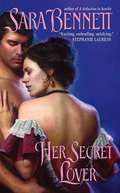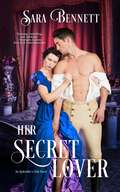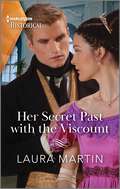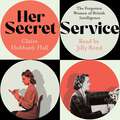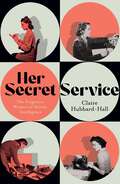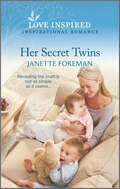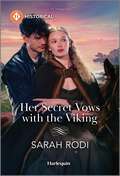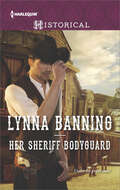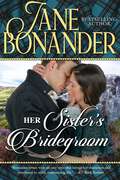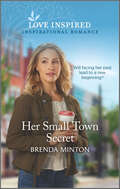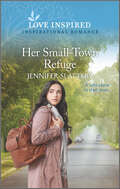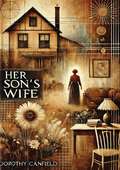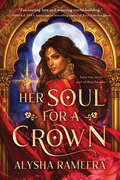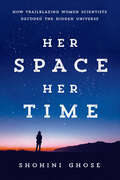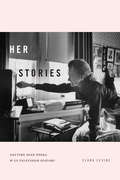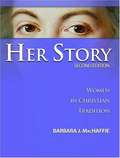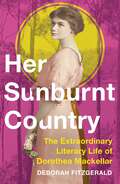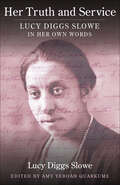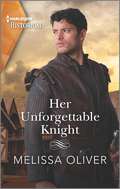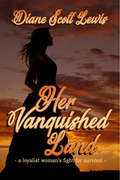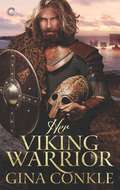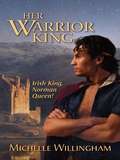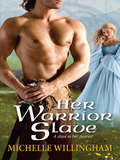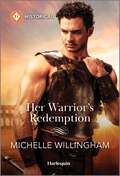- Table View
- List View
Her Secret Lover
by Sara BennettDesperate to save her reputation, the beautiful heiress Antoinette Dupre escapes to Wexmoor Manor, a country estate in Devon. But she gets more than she bargained for when she encounters a masked stranger who, with just one touch, awakens in her an irresistible desire. Gabriel Langley is on a mission. Antoinette has a letter he needs to take back his family's ancestral home, and he is willing to go to any lengths to claim it-even seduce her. And though aware he is playing a dangerous game, he cannot resist returning to her bed in the shadow of darkness . . . to become her secret lover. But when Gabriel's true identity is revealed, their passionate midnight interludes are threatened. And they must face a web of scandal and blackmail that could destroy their one chance for love . . .
Her Secret Lover (Aphrodite’s Club #2)
by Sara BennettTo save her reputation, lovely heiress Antoinette Dupre flees from London to Devon and Wexmoor Manor, a country estate. But she flies from one danger to another when she encounters a masked stranger, who, with one touch, arouses Antoinette’s own insatiable hunger.Gabriel Langley is no saint, he wants what he wants — a letter in Antoinette’s possession — and nothing, even the scandal of seducing her can stand in his way, especially since he finds her impossible to resist. Provocative and sultry, they embark on a dangerous game; in the moonlit shadows everything is laid bare. But when Gabriel’s identity comes to light, the consequences could destroy their chances at forever.
Her Secret Past with the Viscount
by Laura MartinComing soon! Her Secret Past with the Viscount by Laura Martin will be available Sep 26, 2023.
Her Secret Service: The Forgotten Women of British Intelligence
by Claire Hubbard-Hall'Groundbreaking' Sunday Times'Beautifully written and elegiac . . . a masterpiece' Damien Lewis, Sunday Times bestselling authorSince the inception of the Secret Service Bureau back in 1909, women have worked at the very heart of British secret intelligence - yet their contributions have been all but written out of history. From encoding orders and decrypting enemy messages to penning propaganda and infiltrating organisations, the women of British intelligence played a pivotal role in both the First and Second World Wars. These true custodians of Britain's military secrets include Kathleen Pettigrew, personal assistant to the Chief of MI6 Stewart Menzies, who late in life declared 'I was Miss Moneypenny, but with more power', to Jane Archer, the very first female MI5 officer who raised suspicions about the Soviet spy Kim Philby long before he was officially unmasked and Winifred Spink, the first female officer ever sent to Russia in 1916. Drawing on private and previously classified documents, Hubbard-Hall rescues these women from obscurity, bringing their gripping stories to life to provide a definitive account of women's contributions to the history of the intelligence services.'A fascinating history of the pivotal role played by women in the British intelligence services. A hugely enjoyable read' Clare Mulley, author of Agent Zo
Her Secret Service: The Forgotten Women of British Intelligence
by Claire Hubbard-HallSince the inception of the Secret Service Bureau back in 1909, women have worked at the very heart of British secret intelligence - yet their contributions have been all but written out of history. Now, drawing on private and previously-classified documents, leading historian Claire Hubbard-Hall brings their gripping true stories to life.From encoding orders and decrypting enemy messages to penning propaganda and infiltrating organisations, the women of British intelligence played a pivotal role in both the First and Second World Wars. Prepare to meet the true custodians of Britain's military secrets, from Kathleen Pettigrew, personal assistant to the Chief of MI6 Stewart Menzies, who late in life declared 'I was Miss Moneypenny, but with more power', to Jane Archer, the very first female MI5 officer who raised suspicions about the Soviet spy Kim Philby long before he was officially unmasked and Winifred Spink, the first female officer ever sent to Russia in 1916. In Her Secret Service, Hubbard-Hall rescues these silenced voices and those of many other fascinating women from obscurity to provide a definitive account of women's contributions to the history of the intelligence services.
Her Secret Twins
by Janette ForemanRevealing the truth is not as simple as it seems…Bound by an inheritance…and two adorable little babies.Kallie Shore has just inherited her father’s ranch. The catch? She has to share it with her ex-fiancé, Grant Young—who’s about to learn he’s also the father of her infant twins! Now they’re working and parenting together, and Kallie might be falling for Grant all over again. But can she trust that this wandering cowboy has finally found his way home?
Her Secret Vows with the Viking
by Sarah RodiLose yourself in this dramatic Viking tale filled with explosive secrets and scorching passion!&“The lady is already married.To me.&” A year ago, Viking Stefan&’s clandestine marriage to Saxon maiden Ædwen was torn apart by the shocking discovery that her father murdered his family. Unable to forgive his wife for hiding the truth, Stefan left. Until word reaches him that Ædwen is about to wed again… Forced to marry at her father&’s command, Ædwen&’s stunned when Stefan bursts through the church doors and announces that she&’s already wed—to him! As the warrior steals her away, passion reignites, but can Ædwen ever trust him again, when Stefan left her alone, devastated—and carrying his baby…!From Harlequin Historical: Your romantic escape to the past.
Her Sheriff Bodyguard: Her Sheriff Bodyguard Enslaved By The Desert Trader Royalist On The Run
by Lynna Banning“A delightful and passionate western romance about a courageous Boston suffragette who meets her match in a stubborn Devil with spurs and a badge.” —RT Book Reviews“Ladies unite. Votes for women!” Caroline MacFarlane has one mission in life. The pain she experienced at the hands of her father is numbed when she stands on stage and teaches the world that women are just as strong, rational and capable as men! But when her safety is threatened, suddenly protective sheriff Hawk Rivera is glued to her side—day and night. This unexpected bodyguard has Caroline’s life in his hands, and she’s surprised to find that Hawk’s commanding presence is not just reassuring, but enticing, too . . .
Her Sister's Bridegroom
by Jane BonanderBestselling author Jane Bonander delights with enchanting historical romances set on the Scottish borderlands, perfect for fans of Paula Quinn and Karen Marie Moning. &“Bonander writes with an easy style that brings her characters and timeframe to vivid, entertaining life.&” —RT Book Reviews Robbie Fleming is out of options. When Robbie Fleming is evicted from her Edinburgh rooming house, she fears she&’ll have to live on the street. Penniless, orphaned, and on poor terms with her only relative—her fraternal twin sister, Birdie—Robbie has nowhere to go. But then she receives a letter from Gavin Eliot, the man she has pined for since she was a girl. Although Gavin (and every other male within miles) seemed head over heels in love with flirty and vivacious Birdie, his letter holds a surprise: He wants to marry Robbie. Thrilled by the proposal and her change of luck, Robbie accepts, landing on his doorstep with little more than the clothes on her back. Gavin Eliot has his head in the clouds. When Robbie shows up at his borderlands manor, Gavin&’s astonished to realize that he&’s just unwittingly proposed to the wrong sister. But with Robbie in need of a home and Gavin honor-bound to his word, they find themselves headed to the altar. Will Robbie&’s heart heal from the betrayal? And can Gavin learn to love the last woman he ever expected to marry?
Her Small Town Secret
by Brenda MintonWill facing her past lead to a new beginning? Revealing the truthcould change everything…Just as things start to come together for single mom Avery Hammons, her carefully ordered world is flipped upside down by the arrival of Grayson Stone, her daughter’s secret father. Now Grayson wants to be part of their daughter’s life, even as he plans to return to California. But can Avery trust the man who once abandoned her with her little girl’s heart…and her own?From Love Inspired: Uplifting stories of faith, forgiveness and hope.
Her Small-Town Refuge: An Uplifting Inspirational Romance
by Jennifer SlatteryTo secure the future she&’s been wishing for, she must earn her boss&’s trust. Escaping to the Texas Hill Country with her daughter for a vet tech internship is Stephanie Thornton&’s chance at a safer life. But when medicine goes missing from Caden Stoughton&’s struggling vet clinic, all evidence points to Stephanie. With the new life she&’s been searching for hanging in the balance, Stephanie must convince Caden to trust her with his business…and his heart.From Love Inspired: Uplifting stories of faith, forgiveness and hope.
Her Son's Wife
by Dorothy CanfieldHer Son’s Wife by Dorothy Canfield is a deeply insightful and emotionally rich novel that explores the complexities of family relationships, generational conflict, and personal growth. First published in 1926, the story revolves around Mrs. Lydia Emery, a refined and controlling woman whose carefully ordered life is upended when her son, Lancelot, unexpectedly marries the free-spirited and unconventional Ruth.The novel focuses on Lydia’s struggle to accept Ruth, who represents everything she disapproves of—unpolished, carefree, and indifferent to societal expectations. As Lydia’s influence over her son begins to wane, she is forced to confront her own prejudices, pride, and emotional insecurities. Through nuanced character development, Canfield paints a portrait of a woman who must come to terms with the changing dynamics of her family and the reality that love, family, and happiness often take unexpected forms.Lydia’s journey toward acceptance is at the heart of the novel, as she learns painful but transformative lessons about letting go of control, forgiving imperfections, and embracing personal change. Canfield’s writing masterfully captures the tensions between old and new values, offering a timeless exploration of how love and acceptance can bridge even the deepest divides within families.Her Son’s Wife is not just a story about familial conflict; it is a meditation on personal transformation and the human capacity for growth. With sensitivity and psychological insight, Canfield delves into themes of pride, forgiveness, and the power of relationships to challenge and heal.This novel will appeal to readers who appreciate thoughtful character studies and stories about the emotional landscapes of family life. Her Son’s Wife remains a compelling and relevant exploration of human nature, revealing the unexpected ways in which love can shape—and reshape—our lives.
Her Soul for a Crown
by Alysha Rameera**SPECIAL DELUXE EDITION WITH DESIGNED EDGES, CHARACTER ART, MAP, AND MORE.**For readers of Sarah J Maas, Scarlett St. Clair, and Tasha Suri's The Jasmine Throne, this epic, slow-burn romantasy inspired by Sri Lankan mythology follows a fierce orphaned young woman with an affinity for poisons and revenge who would do anything to end the reign of heartless rajas—even sell her soul to the most dangerous cursed god of all—the Blood Yakka, Reeri.Anula Ramanayake of Anuradhapura calculated her ascent the moment she was orphaned—when her village burned in an endless war and the gods forsook her prayers. First, she would marry the raja. Then, she would poison him and take the throne for herself and her people. But when an unexpected coup thwarts her careful plans, Anula is left with one desperate option. She offers her soul to the cursed gods she renounced in exchange for the crown. In the Second Heavens, Reeri the Blood Yakka, the most dangerous and powerful of his clan, hears her prayer. For eons, he's waited for such a valuable offering—one that could finally give him the chance to kill his divine tormentor and return his fellow Yakkas to their former glory on earth. Reeri accepts Anula's bargain, tethering them until their goals are achieved, or until they die.As the war presses on, Anula must move quickly or lose her chance to become the first raejina. But while she is skilled at many things, especially in stopping hearts, the closer she grows to Reeri, the more she finds her own heart at risk. And when the time comes to fight enemies both human and divine, Anuradhapura and the Heavens will never be the same.
Her Space, Her Time: How Trailblazing Women Scientists Decoded the Hidden Universe
by Shohini GhoseOne of Canada's leading physicists celebrates the many, groundbreaking women scientists who came before her—unsung explorers of the cosmos who both discovered the fundamental rules of the universe and challenged social rules, yet whose names remain largely unknown to us.Her Space, Her Time shares the stories of women in physics and astronomy whose work expanded scientific understanding yet whose accomplishments are often overlooked—creating a thrilling account of scientific discovery, inspirational leadership and persistence in the face of overwhelming challenges. In shaping her narrative around the science that fascinated them and the social context in which they worked, award-winning quantum physicist Shohini Ghose champions these remarkable women&’s contributions, which loom even larger given the misogyny and discrimination they faced. Ghose's canvas stretches from the 19th century to the present and includes many women whose work led to Nobel Prizes that were ultimately awarded to men. Among this list of impressive scientists: Henrietta Leavitt and Margaret Burbidge, who helped discover the big bang and the cosmic calendar; Anigaduwagi (Cherokee) aerospace scientist Mary Golda Ross, who helped make the Moon landings possible; atom splitter Lise Meitner; Bibha Chowdhuri, who discovered two fundamental particles; and Harriet Brooks—a Canadian physicist whose impact on radioactivity research was compared to Marie Curie&’s, but who felt that marriage, not science, was the choice she had to make. Engaging and inspirational, Her Space, Her Time is threaded through with Ghose's own experiences in science—women in STEM still face the same kind of challenges her subjects encountered—and driven by the imperative to make the invisible visible, ensuring that the names of these women who pursued science against all odds will never be forgotten.
Her Stories: Daytime Soap Opera and US Television History (Console-ing Passions)
by Elana LevineSince the debut of These Are My Children in 1949, the daytime television soap opera has been foundational to the history of the medium as an economic, creative, technological, social, and cultural institution. In Her Stories, Elana Levine draws on archival research and her experience as a longtime soap fan to provide an in-depth history of the daytime television soap opera as a uniquely gendered cultural form and a central force in the economic and social influence of network television. Closely observing the production, promotion, reception, and narrative strategies of the soaps, Levine examines two intersecting developments: the role soap operas have played in shaping cultural understandings of gender and the rise and fall of broadcast network television as a culture industry. In so doing, she foregrounds how soap operas have revealed changing conceptions of gender and femininity as imagined by and reflected on the television screen.
Her Story: A Timeline of the Women Who Changed America
by Charlotte S. Waisman Jill S. TietjenMost people have heard of Susan B. Anthony, Harriet Tubman, Margaret Sanger, and Eleanor Roosevelt. But did you know that a female microbiologist discovered the bacterium responsible for undulant fever, which then led to the pasteurization of milk? Or that a female mathematician's work laid the foundation for abstract algebra?Her Story is a one-of-a-kind illustrated timeline highlighting the awesome, varied, and often unrecognized contributions of American women throughout U.S. history, beginning in the 1500s and spanning all the way through 2011. The women featured in Her Story range from writers, artists, actors, and athletes to doctors, scientists, social and political activists, educators, and inventors, and come from all backgrounds and philosophies. Her Story is a captivating look at America's often unsung female champions that will resonate with women and men alike.
Her Story: Women In Christian Tradition
by Barbara J. MachaffieAn accessible, introductory text first published by Fortress Press in 1983, Her Story: Women in Christian History has sold over 30,000 copies of the first edition and has ably helped readers recover the oft-ignored or submerged stories of women in the Christian tradition, from biblical times to now. Barbara MacHaffie, who wrote the brief history and compiled a lively anthology of companion primary readings, has revised and updated the text and readings. In this new edition, history and primary readings are combined and augmented with helpful pedagogical tools. This new textbook, which offers sympathetic coverage of all Christian traditions, is supported by a dedicated Web site that includes chapter summaries, questions for discussion and Web links that vividly bring the stories of women to life in portraits, artifacts, and other primary materials.
Her Sunburnt Country: The Extraordinary Literary Life of Dorothea Mackellar
by Deborah FitzGeraldThe official biography of Australian poet and writer Dorothea Mackellar, author of the celebrated poem &‘My Country.&’ 'I love a sunburnt country, a land of sweeping plains…&’ Though many Australians know lines from Dorothea Mackellar&’s classic poem &‘My Country&’ by heart, very little has been written about the poet&’s extraordinary life. From her childhood and youth in Sydney&’s Point Piper, to discovering her love for the Australian landscape on the family farm in Gunnedah, Dorothea engaged with the intellectual elite of Sydney and abroad as she embarked on a decades-long literary career that saw her linked to some of the leading lights of her day. A keen traveller, Dorothea ventured as far as Japan, Egypt and the Caribbean between longer stints in Europe. In the heart of literary London, she socialised with Joseph Conrad and Ezra Pound. At home, she counted among her friends Ether Turner, the famed war correspondent Charles Bean, and journalistic royalty in the form of the Fairfax family. Never before published letters and diaries reveal her unorthodox relationship with her best friend and collaborator Ruth Bedford. Battling against a masculine tradition of Australian bush poetry led by Banjo Paterson and Henry Lawson, Dorothea Mackellar boldly carved out a place for herself, leaving an indelible mark on the Australian imagination. Now, for the first time, the poet's unconventional life story is told – a hidden gem of Australian history, and a tale of one woman&’s extraordinary passion for her poetry, her family and her country.
Her Truth and Service: Lucy Diggs Slowe in Her Own Words
by Lucy Diggs SloweLucy Diggs Slowe (1885–1937) was one of the most remarkable and accomplished figures in the history of Black women’s higher education. She was a builder of institutions, organizing the first historically Black sorority, Alpha Kappa Alpha, while a student at Howard University in 1908; establishing the first junior high school for Black students in Washington, D.C.; and founding as well as leading other major national and community organizations. In 1922 Slowe was appointed the first Dean of Women at Howard, making her the first Black woman to serve as dean at any American university. Beyond her trailblazing career in higher education, she was a committed teacher, an ardent antiracist advocate, and even a national tennis champion.Her Truth and Service showcases Slowe’s speeches, articles, and letters, illuminating her multifaceted accomplishments and unwavering dedication to the quest for equality and justice. In these texts, readers encounter Slowe’s powerful voice and keen intellect, witnessing her triumphs and travails as an educator, a leader, and a Black woman in a deeply exclusionary society. Slowe’s writings depict her personal and professional efforts to topple race and gender barriers and open up greater opportunities for Black women and girls, as well as the obstacles she faced in male-dominated institutions including the Howard administration. Her Truth and Service is an important document of a significant figure in the development of Black institutions and an inspiring testament to the lifelong struggle for social justice.
Her Unforgettable Knight (Protectors of the Crown #3)
by Melissa OliverDanger abounds in this dramatic medieval romanceShe never forgot him…Can she ever forgive him? Marguerite never expected to see Savaric again—let alone to have to help him when she finds him outnumbered in a fight. He&’s the brooding knight she fell for two years ago…until he left her unexpectedly. Now Marguerite is a hardened spy and wary of trusting him again. But how long can she resist their connection when they must work together to protect the Crown?From Harlequin Historical: Your romantic escape to the past.Protectors of the CrownBook 1: A Defiant Maiden's KnightBook 2: A Stolen Knight's KissBook 3: Her Unforgettable Knight
Her Vanquished Land
by Diane LewisIn 1780, Loyalist Rowena Marsh insists on spying for the British during the American Revolution. As a girl, she must dress as a boy, plus endure devastation and murder as she decodes messages for a mysterious Welshman. The tide has turned in the rebels’ favor. General George Washington appears to be winning. The loyalists are bombarded by threats and lost battles. Rowena stays determined to aid the British cause and preserve her family as they’re chased from their Pennsylvania home.
Her Viking Warrior (Forgotten Sons #2)
by Gina ConkleWhen an outcast goes home and meets a woman seeking justice, hearts will clash…Eighteen years ago, Bjorn was exiled from Vellefold. Honor-bound to return, he’ll fight for the settlement…then walk away. First, he must work with his childhood friend, now a beautiful, high-ranking Viking lady.Fierce of spirit, Ilsa will do anything to save her people, including convincing the banished son to take the jarl’s seat. But she has her doubts about the stone-hearted Viking, despite the lust between them. It’s only a matter of time before Bjorn discovers that Ilsa is hiding dangerous secrets, secrets that may jeopardize all they’ve worked for.When the darkest hour comes, the once-rejected warrior must choose: rescue his men, the Forgotten Sons—or Ilsa, the woman he craves, body and soul.One-click with confidence. This title is part of the Carina Press Romance Promise: all the romance you’re looking for with an HEA/HFN. It’s a promise!This book is approximately 78,000 words
Her Warrior King
by Michelle WillinghamBlackmail forced Patrick MacEgan into marriage--although he could not be forced to bed his Norman bride. But Isabel de Godred was as fair as she was determined to be a proper wife. . . . She wished to help her proud warrior king with the burden of his responsibilities. As queen, she could aid an alliance between their people. As wife, she longed to comfort him, for when alone, they could put aside war and be but man and woman. . . .
Her Warrior Slave
by Michelle WillinghamKieran Ó Brannon is no ordinary slave--defiant, daring and dangerous, he is untamable! Iseult MacFergus is drawn to this powerful man with the strength of a warrior and the honor of a king. She trusts him to help find her lost child. . . . Kieran sold himself into slavery to save his brother's life, but Iseult, with the face of an angel, gives him hope that he can again be a free man. Determined to find her child, Kieran may finally have his freedom--although now his heart is tied to Iseult's forever. . . .
Her Warrior's Redemption (The Legendary Warriors #3)
by Michelle WillinghamPrepare for a powerful medieval redemption romance, set amid the gritty backdrop of historic Byzantium… They fought for their lives Now they must fight for their love!Trapped in Constantinople&’s brutal fighting pits, Brian of Penrith forms an unbreakable bond with his fellow captive, resilient maiden Velaria. Yet once they escape home to England, Velaria&’s highborn status keeps her out of the humble warrior&’s reach. But their shared struggle in returning to their former lives connects them once more. Though Brian is haunted by past guilt, and Velaria is destined to marry a nobleman, a thrilling attraction ignites! Soon Brian discovers the truth about his past, which gives him hope for redemption and could forever change their fates…From Harlequin Historical: Your romantic escape to the past.The Legendary WarriorsBook 1: The Iron Warrior ReturnsBook 2: The Untamed Warrior's BrideBook 3: Her Warrior's RedemptionHer Warrior&’s Redemption is a crossover story, connecting The Legendary Warriors series with The MacEgan Brothers series!
